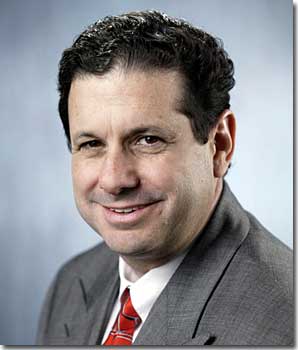Close to His Heart
Over 1,000 times a year, Dr. Paul Teirstein ’76 inserts a needle into an artery in his patient’s arm or leg. Through this needle Teirstein sends a thin wire and then a catheter that runs straight to the patient’s heart. Teirstein then injects the heart with a contrast solution that will show him (via an X-ray screen) where the patient’s failing heart is blocked with plaque.

The procedure, angioplasty, is a huge advance over much more traumatic open-heart surgery. As the director of interventional cardiology at the Scripps Clinic and Research Foundation in La Jolla, California, and vice president and secretary of Medivas LLC (a growing biotech company), Teirstein is a recognized leader and innovator in his field.
It all began during his junior year at Vassar, when he started encouraging his Terrace Apartment-mates to get drunk—not for fun, of course: Teirstein’s inebriated housemates were his subjects for course research. They did their drinking in Olmsted Hall while the future doctor studied the effects of alcohol on their brain waves. To this day, Teirstein is grateful to his “mentors” in the Vassar biology department who, he says, “motivated [him] to get involved in research.”
After his junior year at Vassar, he worked on a summer project with biology professor Leathem Mehaffey. During this time, Teirstein became interested in the circadian rhythms of the retina. He says, “In medical school I wanted to continue this research, so I wrote to the director of vision research at the National Institutes of Health (NIH), describing my work at Vassar and some ideas I had for new experiments.”
On the strength of this research, Teirstein spent time at the NIH before going to medical school at Mount Sinai, where he continued his research, even starting his own “little laboratory” there. Teirstein says he was only a “reasonably good student” in medical school, yet his research experience made him stand out and ultimately won him a place at the very prestigious Brigham and Women’s Hospital (Harvard’s teaching affiliate) for his internship and residency.
At The Brigham he focused on cardiology because, he says, “The mentors I respected most were all cardiologists. Cardiology also involved a lot of new technology, and I was mesmerized by the constant stream of dramatic innovations.” Later, while doing his cardiology fellowship at Stanford, Teirstein had several teachers who were also inventors.

In 1997 Teirstein heard from a scientist at Cornell who was working on a polymer that could slowly release drugs into the body as it dissolved. Teirstein recognized that the technology could be useful in any number of medical fields, including his own. Persuaded by an entrepreneur friend, he not only helped the Cornell scientist find a buyer for the new polymer, he set up the company that would buy and manufacture it. The company, Medivas, started out as just “a tiny office, with two employees and this novel polymer technology,” Teirstein says. It now has “80 employees housed in 50,000 square feet of laboratory and manufacturing space.” The company’s quick success has allowed Teirstein to stick to his roots. “The company is enormously exciting,” he says, “but I am still very much a full-time cardiologist, so I now serve only as an advisor and am not involved in day-to-day company operations.”
Considering his success, it wouldn’t be surprising if Teirstein believed himself blessed. In his case, being blessed is literal. In 1990 Mother Teresa was in Mexico at one of her missions when she began to have serious heart problems and was brought to Dr. Teirstein’s hospital in California for treatment. “She had a number of very blocked heart arteries, and opening them was quite difficult,” says Teirstein. He was able to help her by using some of his stents, and she lived for seven more years. Immediately after the operation, says Teirstein, “She told me that during the procedure the Pope had my name and was praying for me.” Not bad for a guy who got his start by getting his housemates drunk.
